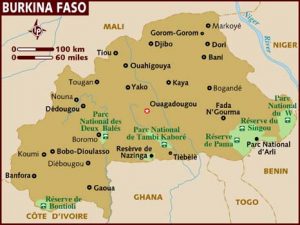Burkina Faso, a landlocked country in West Africa and formerly known as Upper Volta, became independent on August 5, 1960. The country, which is slightly larger than Colorado, is surrounded by Côte d’Ivoire, Mali, Niger, Benin, Togo, and Ghana. Burkina Faso’s landscape is desert in the north, along with low hills, high savannas and extensive plains.

The Mossi warriors entered the region from the 11th to the 13th century and subjugated the weaker tribes to their rule. They called the land Mogho or “country of the Mossi” and established five independent kingdoms. The kingdoms were Tenkodogo, Yatenga, Gourma, Zandoma and Ouagadougou. Each was ruled by a king and Ouagadougou was the most powerful of the kingdoms.
By 1896, the kingdoms that made up the region had become a French protectorate. The French divided the country into administrative circles but allowed the chiefs, including the former Mossi kings, to remain in their traditional roles. At first, the country was attached to Upper Senegal–Niger but was reorganized as a separate colony known as Upper Volta in 1919.
In 1958, voters in Upper Volta approved the new constitution of the Fifth French Republic and Upper Volta’s territorial assembly voted to make the country an autonomous state within the French Empire. By this time, political power was in the hands of the young European-educated elite and the traditional chiefs had already lost much of their influence. When independence was proclaimed on August 5, 1960, the new constitution called for an executive president to be elected for a five-year term and included an elected Legislative Assembly.
The newly independent country was first led by Maurice Yameogo until he was overthrown in 1966 by Sangoule Lamizana. Upper Volta suffered from reoccurring droughts and military coups. By 1980, President Lamizana was overthrown in a coup led by Saye Zerbo and Zerbo was overthrown two years later by Jean-Baptiste Ouedraogo. This ushered in a period of unrest and power struggles.
Upper Volta was renamed Burkina Faso in 1984 by former President Thomas Sankara and it means “land of honest men.” In 2016, Roch Marc Christian Kabore won the presidential elections in Burkina Faso after facing months of political unrest.